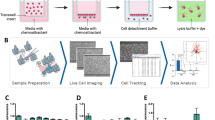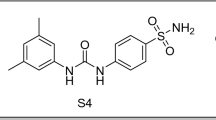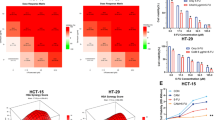Abstract
Aim:
Clinical treatment of solid tumors with docetaxel, flavopiridol, or 5-fluorouracil (5-FU) often encounters undesirable side effects and drug resistance. This study aims to evaluate the potential role of combination therapy with docetaxel, flavopiridol, or 5-FU in modulating chemosensitivity and better understand how they might be used clinically.
Methods:
HCT116 colon cancer cells were treated with docetaxel, flavopiridol, and 5-FU in several different administrative schedules in vitro, either sequentially or simultaneously. Cell survival was measured by MTT assay. The activity of caspase-3 was determined by caspase-3 assays and the soft agar colony assay was used to test the colony formation of HCT116 cells in soft agar. We also established xenograft models to extend in vitro observations to an in vivo system.
Results:
The maximum cytotoxicity was found when human colon cancer HCT116 cells were treated with docetaxel for 1 h followed by flavopiridol for 24 h and 5-FU for another 24 h. This sequential combination therapy not only inhibits tumor cell growth more strongly compared to other combination therapies but also significantly reduces colony formation in soft agar and augments apoptosis of HCT116 cells. Sequencing of docetaxel followed 1 h later by flavopiridol, followed 24 h later by 5-FU in xenograft models, also resulted in delayed tumor growth and higher survival rate.
Conclusion:
These results highlight the importance of an administrative schedule when combining docetaxel with flavopiridol and 5-FU, providing a rationale explanation for its development in clinical trials.
Similar content being viewed by others
Log in or create a free account to read this content
Gain free access to this article, as well as selected content from this journal and more on nature.com
or
References
Nishizaki M, Meyn RE, Levy LB, Atkinson EN, White RA, Roth JA, et al. Synergistic inhibition of human lung cancer cell growth by adenovirus-mediated wild-type p53 gene transfer in combination with docetaxel and radiation therapeutics in vitro and in vivo. Clin Cancer Res 2001; 7: 2887–97.
Hennequin C, Giocanti N, Favaudon V . Interaction of ionizing radiation with paclitaxel (Taxol) and docetaxel (Taxotere) in HeLa and SQ20B cells. Cancer Res 1996; 56: 1842–50.
Mason KA, Hunter NR, Milas M, Abbruzzese JL, Milas L . Docetaxel enhances tumor radioresponse in vivo. Clin Cancer Res 1997; 3: 2431–8.
Kaye SB . Docetaxel (Taxotere) in the treatment of solid tumors other than breast and lung cancer. Semin Oncol 1995; 22: 30–3.
Shibuya Y, Tanimoto H, Umeda M, Yokoo S, Komori T . Induction chemotherapy with docetaxel, cisplatin and 5-fluorouracil for Tongue cancer. Kobe J Med Sci 2004; 50: 1–7.
Ghaemmaghami M, Jett JR . New agents in the treatment of small cell lung cancer. Chest 1998; 113: 86S–91S.
Miller V . Docetaxel (Taxotere) in combination with vinorelbine in non-small cell lung cancer. Semin Oncol 1999; 26: 12–4.
Nabholtz JM, Smylie M, Mackey J, Au HJ, Tonkin K, Au R, et al. Docetaxel and anthracycline polychemotherapy in the treatment of breast cancer. Semin Oncol 1999; 26: 47–52.
Rizvi NA . Docetaxel (Taxotere) and gemcitabine in combination therapy. Semin Oncol 1999; 26: 19–22.
Shapiro GI . Preclinical and clinical development of the cyclin-dependent kinase inhibitor flavopiridol. Clin Cancer Res 2004; 10: 4270s–75s.
Dai Y, Grant S . Small molecule inhibitors targeting cyclin-de-pendent kinases as anticancer agents. Curr Oncol Rep 2004; 6: 123–30.
Hunter T, Pines J . Cyclins and cancer II: cyclin D and CDK inhibitors come of age. Cell 1994; 79: 573–82.
Drees M, Dengler WA, Roth T, Labonte H, Mayo J, Malspeis L, et al. Flavopiridol (L86-8275): selective antitumor activity in vitro and activity in vivo for prostate carcinoma cells. Clin Cancer Res 1997; 3: 273–9.
Achenbach TV, Muller R, Slater EP . Bcl-2 independence of flavopiridol-induced apoptosis. Mitochondrial depolarization in the absence of cytochrome c release. J Biol Chem 2000; 275: 32089–97.
Li Y, Bhuiyan M, Alhasan S, Senderowicz AM, Sarkar FH . Induction of apoptosis and inhibition of c-erbB-2 in breast cancer cells by flavopiridol. Clin Cancer Res 2000; 6: 223–9.
Matranga CB, Shapiro GI . Selective sensitization of transformed cells to flavopiridol-induced apoptosis following recruitment to S-phase. Cancer Res 2002; 62: 1707–17.
Semenov I, Akyuz C, Roginskaya V, Chauhan D, Corey SJ . Growth inhibition and apoptosis of myeloma cells by the CDK inhibitor flavopiridol. Leuk Res 2002; 26: 271–80.
Senderowicz AM, Headlee D, Stinson SF, Lush RM, Kalil N, Villalba L, et al. Phase I trial of continuous infusion flavopiridol, a novel cyclin-dependent kinase inhibitor, in patients with refractory neoplasms. J Clin Oncol 1998; 16: 2986–99.
Bissery MC, Guenard D, Gueritte-Voegelein F, Lavelle F . Experimental antitumor activity of taxotere (RP 56976, NSC 628503), a taxol analogue. Cancer Res 1991; 51: 4845–52.
Motwani M, Rizzo C, Sirotnak F, She Y, Schwartz GK . Flavopiridol enhances the effect of docetaxel in vitro and in vivo in human gastric cancer cells. Mol Cancer Ther 2003; 2: 549–55.
Bible KC, Kaufmann SH . Cytotoxic synergy between flavopiridol (NSC 649890, L86-8275) and various antineoplastic agents: the importance of sequence of administration. Cancer Res 1997; 57: 3375–80.
Burris HA 3rd . Docetaxel in combination with fluorouracil for advanced solid tumors. Oncology (Huntingt) 1997; 11: 50–2.
Johnston PG, Kaye S . Capecitabine: a novel agent for the treatment of solid tumors. Anticancer Drugs 2001; 12: 639–46.
Giacchetti S, Perpoint B, Zidani R, Le Bail N, Faggiuolo R, Focan C, et al. Phase III multicenter randomized trial of oxaliplatin added to chronomodulated fluorouracil-leucovorin as first-line treatment of metastatic colorectal cancer. J Clin Oncol 2000; 18: 136–47.
Motwani M, Delohery TM, Schwartz GK . Sequential dependent enhancement of caspase activation and apoptosis by flavopiridol on paclitaxel-treated human gastric and breast cancer cells. Clin Cancer Res 1999; 5: 1876–83.
Motwani M, Jung C, Sirotnak FM, She Y, Shah MA, Gonen M, et al. Augmentation of apoptosis and tumor regression by flavopiridol in the presence of CPT-11 in Hct116 colon cancer monolayers and xenografts. Clin Cancer Res 2001; 7: 4209–19.
Schwartz GK, Farsi K, Maslak P, Kelsen DP, Spriggs D . Potentiation of apoptosis by flavopiridol in mitomycin-C-treated gastric and breast cancer cells. Clin Cancer Res 1997; 3: 1467–72.
Wittmann S, Bali P, Donapaty S, Nimmanapalli R, Guo F, Yamaguchi H, et al. Flavopiridol down-regulates antiapoptotic proteins and sensitizes human breast cancer cells to epothilone B-induced apoptosis. Cancer Res 2003; 63: 93–9.
Author information
Authors and Affiliations
Additional information
This work was supported by the Helen and Alden Wagner Cancer Fund, the Nasher Cancer Research Program, and by a grant from Aventis Pharmaceuticals.
Rights and permissions
About this article
Cite this article
Guo, J., Zhou, Aw., Fu, Yc. et al. Efficacy of sequential treatment of HCT116 colon cancer monolayers and xenografts with docetaxel, flavopiridol, and 5-fluorouracil. Acta Pharmacol Sin 27, 1375–1381 (2006). https://doi.org/10.1111/j.1745-7254.2006.00421.x
Received:
Accepted:
Issue date:
DOI: https://doi.org/10.1111/j.1745-7254.2006.00421.x
Keywords
This article is cited by
-
Non-invasive saliva human biomonitoring: development of an in vitro platform
Journal of Exposure Science & Environmental Epidemiology (2017)
-
Sequential combination therapy with flavopiridol and autocatalytic caspase-3 driven by amplified hTERT promoter synergistically suppresses human ovarian carcinoma growth in vitro and in mice
Journal of Ovarian Research (2014)



